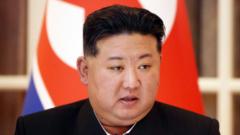In a recent development, North Korean state media has announced the successful test of two advanced air defense missiles under the direct supervision of Kim Jong Un. The missiles were touted to possess "superior combat capability" and incorporate "unique technology," as reported by the Korean Central News Agency (KCNA). Though specific details remained scarce, KCNA claimed the launches demonstrated the missiles' effectiveness in targeting various aerial threats, including drones and cruise missiles. This missile test follows a tense standoff, with South Korea recently firing warning shots at North Korean soldiers who briefly ventured across the Demilitarized Zone (DMZ), a heavily fortified barrier between the two nations.
The United Nations Command confirmed the incursion of approximately 30 North Korean troops into South Korean territory, leading to Pyongyang's accusations of "deliberate provocation" against Seoul. This escalation coincides with ongoing large-scale joint military exercises being conducted by South Korean and United States forces in the region, further straining relations.
As diplomatic efforts aimed at improving inter-Korean ties falter, South Korean President Lee Jae Myung is set to meet with U.S. President Donald Trump in Washington, hoping to address the rising tensions. However, Kim's sister has rejected previous overtures from Lee's administration for reconciliation. Earlier this month, Kim condemned the U.S.-South Korea military drills, characterizing them as "hostile and confrontational," and reiterated his intention to enhance North Korea's nuclear arsenal.
Concerns have also emerged regarding potential exchanges between North Korea and Russia, with senior South Korean officials indicating that Pyongyang may have received missile technology from Moscow in return for military support amid the ongoing conflict in Ukraine. While it is unclear if the recently tested missiles were developed using Russian technology, the potential collaboration has raised alarms in Seoul.
The Korean Peninsula remains a focal point of military tension, with North Korea continuing its authoritarian rule under the Kim dynasty since the Korean War, which concluded in 1953 without a formal peace treaty. While hostilities have abated over the years, the latest military maneuvers are a stark reminder of the fragile peace that exists in the region.
The United Nations Command confirmed the incursion of approximately 30 North Korean troops into South Korean territory, leading to Pyongyang's accusations of "deliberate provocation" against Seoul. This escalation coincides with ongoing large-scale joint military exercises being conducted by South Korean and United States forces in the region, further straining relations.
As diplomatic efforts aimed at improving inter-Korean ties falter, South Korean President Lee Jae Myung is set to meet with U.S. President Donald Trump in Washington, hoping to address the rising tensions. However, Kim's sister has rejected previous overtures from Lee's administration for reconciliation. Earlier this month, Kim condemned the U.S.-South Korea military drills, characterizing them as "hostile and confrontational," and reiterated his intention to enhance North Korea's nuclear arsenal.
Concerns have also emerged regarding potential exchanges between North Korea and Russia, with senior South Korean officials indicating that Pyongyang may have received missile technology from Moscow in return for military support amid the ongoing conflict in Ukraine. While it is unclear if the recently tested missiles were developed using Russian technology, the potential collaboration has raised alarms in Seoul.
The Korean Peninsula remains a focal point of military tension, with North Korea continuing its authoritarian rule under the Kim dynasty since the Korean War, which concluded in 1953 without a formal peace treaty. While hostilities have abated over the years, the latest military maneuvers are a stark reminder of the fragile peace that exists in the region.




















